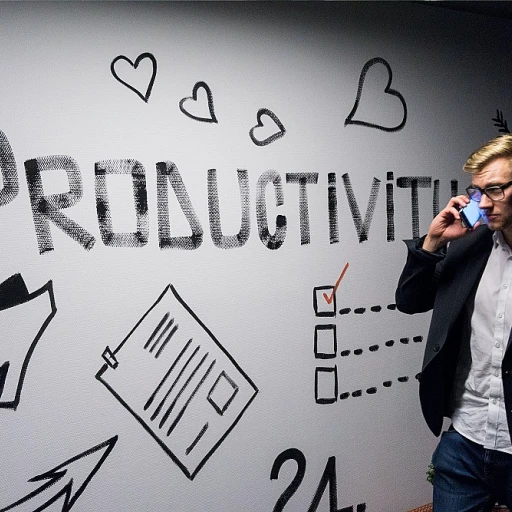
The Rise of Remote Work
Embracing Remote Opportunities
The Collision Conference in NOLA is a vibrant hub for exploring the cutting-edge trends in technology and business. One of the most significant transformations discussed at this year's event is the rise of remote work. With an increasing number of companies in this growing tech city adopting flexible working policies, remote work is shifting from being a privilege to a standard practice across various industries. As attendees from different countries converge at the conference, there's a unified recognition that remote work is here to stay. This trend is driven by factors such as technological advancements and the current global business environment. Enterprises are leveraging innovations in communication and collaboration tools, which have made connecting with colleagues across the globe more efficient than ever before. The economic development of cities like New Orleans, moving towards these new workplace models, reflects a broader shift. Businesses that traditionally relied on local talent are now able to tap into a global workforce, dramatically increasing their pool of potential employees. The convention center buzz with discussions around how this trend impacts not only business efficiency but also diversity and inclusion, as companies can draw on a diverse talent pool without geographical constraints. Moreover, conference attendees are keenly aware of the implications for upskilling and reskilling programs. As remote work continues to grow, the demand for digital literacy rises, urging organizations to provide relevant training to their workforce. To navigate these changes effectively and remain competitive in the evolving landscape, companies need to prioritize creating an inclusive and supportive remote working culture. This includes investing in the right technology, flexible working hours, and establishing clear communication channels. To dive deeper into this topic, Navigating the Waves of Change in the Future of Work offers valuable insights.AI and Automation in the Workplace
Redefining Roles with AI Integration
The rapidly advancing artificial intelligence (AI) and automation technologies are pivotal themes in the discussions at tech events like the Collision Conference, held in New Orleans. As the landscape of technology continues to evolve, businesses are increasingly exploring how AI can streamline operations and drive efficiency. AI tools and automated processes are transforming various sectors, from manufacturing to customer service. These technologies not only enhance productivity but also redefine job roles. As mundane tasks become automated, human labor can focus on more strategic and creative endeavors. Attendees at the conference highlighted the need for companies to strategically integrate these technologies, ensuring a balance between innovation and employment. In the bustling city of NOLA, the collision of innovative tech and business strategies is reshaping the future workplace. As a growing tech hub, New Orleans is witnessing firsthand how AI and automation are not just buzzwords but integral components of modern economic development. The conversation often pivots to the necessity for businesses to adapt, especially with the acceleration observed in recent years. AI is not replacing jobs; rather, it's an enabler, offering opportunities to enhance skill sets and empower employees. This shift comes with the realization that upskilling and reskilling are crucial to harness these advancements effectively. As we navigate the evolving employment landscape, understanding these dynamics becomes essential. To explore further on how AI and automation are shaping industries and the broader implications for America, you can have a look at the future of work in a connected America.The Gig Economy's Growing Influence
The Shift Towards Gig Economy Dominance
Exploring the shifts in the labor market dynamics, the Collision Conference in NOLA showcases significant insights into how the gig economy is reshaping the business landscape. Over the past few years, the gig economy has emerged as a powerful force in economic development, marking its presence in major tech events such as the collision orleans conference. At this tech conference, attendees from various countries pondered on how business models are rapidly evolving to accommodate this paradigm shift. Gig work is no longer seen as merely a supplementary income source but as a primary career path for many. This trend is especially evident in cities like Orlean three years into this rapid transformation. The convention center buzzed with discussions about adapting traditional work structures to this new reality. The gig economy's rapid ascent is attributed to several factors. The rise of technology platforms that facilitate freelance work, coupled with a growing demand for flexible work arrangements, positions this model as a permanent fixture in the marketplace. Tech companies at the event highlighted their efforts in leveraging AI and automation to streamline gig-based operations, enhancing efficiency and scalability. However, this shift also brings challenges that need addressing. Attendees underscored the importance of establishing fair labor practices and ensuring that gig workers receive adequate protections and benefits. The collision conf provided a platform for dialogue, as business leaders and policymakers discussed potential frameworks to support this essential segment of the workforce effectively. The future of work will increasingly integrate gig economy principles, as companies strive to balance flexibility with sustainability and fair labor standards. For those interested in diving deeper into this evolving job landscape, exploring opportunities in basic industries is a timely consideration. With technology continuing to drive change, the gig economy’s role in shaping future workplaces cannot be overstated. As the ideas exchanged at the Collision Conference in NOLA resonate within the tech community, it is clear that the gig economy is not just a trend; it's a structural shift in how work and employment are conceptualized.Diversity and Inclusion in Future Workplaces
Diversifying the Workplace for Future Success
Diversity and inclusion are becoming paramount as we shape the future of work. The Collision Conference in NOLA underscored the importance of embracing these principles. The event attracted attendees from numerous countries, fueling discussions on how inclusive environments contribute to innovation and business success.
With growing tech sectors in cities worldwide, the call for a diverse workforce resonates strongly. The conference's emphasis on economic development and the role of diversity in driving growth was noteworthy. Attendees recognized that when different perspectives converge, creativity flourishes, leading to advancements in tech and other industries.
In the context of remote work and automation, organizations that prioritize diversity and inclusion are better equipped to adapt to change. This gives them a competitive edge in today's rapidly evolving landscape. Companies are beginning to understand that a diverse team can be more resilient and innovative in tackling future challenges.
The dialogue at the conference highlighted that fostering an inclusive culture goes beyond recruitment. It's also about providing opportunities for upskilling and reskilling employees, ensuring they are prepared for the jobs of tomorrow. Attendees agreed that embracing diversity isn't merely a moral imperative; it's a strategic business decision essential for sustained growth.
As tech events like Collision continue to emphasize these themes, organizations will need to prioritize inclusion to stay ahead. By doing so, they not only contribute to social progress but also forge a path towards a dynamic and successful future of work.
Upskilling and Reskilling for Tomorrow's Jobs
Adapting Skills for a Dynamic Workforce
As the Collision Conference in NOLA highlights, the future of work is not just about embracing new technologies but also about preparing the workforce to thrive in this evolving landscape. The rapid pace of technological advancement, showcased at events like this, underscores the need for continuous learning and adaptation.
Businesses and individuals alike are recognizing the importance of upskilling and reskilling to stay competitive. This trend is evident in the growing number of attendees at tech conferences who are eager to learn about the latest developments in AI, automation, and other emerging technologies.
Here are some key considerations for upskilling and reskilling in the future workplace:
- Embrace Lifelong Learning: The days of a static career path are over. Workers must be prepared to learn new skills throughout their careers to keep pace with technological changes.
- Focus on Soft Skills: While technical skills are crucial, soft skills such as communication, problem-solving, and adaptability are increasingly valued in a tech-driven world.
- Leverage Online Platforms: With the rise of online learning platforms, individuals have more opportunities than ever to acquire new skills at their own pace.
- Collaborate with Industry: Businesses should partner with educational institutions and training providers to ensure that their workforce is equipped with the skills needed for future challenges.
As the conference in Orleans demonstrates, the future of work is a collaborative effort. By investing in upskilling and reskilling, both businesses and workers can ensure they are prepared for the challenges and opportunities that lie ahead.
Sustainability and the Future of Work
Sustaining Tomorrow's Workforces through Eco-friendly Practices
In recent years, sustainability has emerged as a core consideration in the realm of work, driven by the twin accelerators of economic development and technological advancement. The growing tech landscapes in cities like NOLA, which recently hosted the Collision Conference, offer a unique lens through which to view the integration of sustainability into future workspaces.
Technological innovations, frequently showcased at tech conferences, play a pivotal role. They not only foster business growth but also offer sustainable practices that can significantly reduce carbon footprints. At these events, attendees often discuss how advancing tech can transform traditional business processes with eco-conscious alternatives. This shift towards sustainable practices is a crucial aspect of ensuring the longevity and health of both our economies and our planet.
NOLA's annual Collision event, held at the convention center, serves as a beacon for this transformation. Every year, it facilitates dialogues on how industries can evolve beyond their current operations to embrace greener strategies. The conference’s attendees, ranging from startups to Fortune 500 companies, explore innovative approaches to sustainability.
One theme that frequently arises in these discussions is the intersection of AI and automation with eco-friendly initiatives. Automation, when responsibly integrated into business models, can lead to more efficient resource usage, reducing waste and promoting sustainability. Moreover, the integration of AI into various sectors can optimize energy consumption and manage resources prudently.
Another compelling aspect of sustainable practices discussed at Collision involves the gig economy. The shift towards freelance and short-term work engagements is not just altering the job market; it also has the potential to contribute to sustainability. Remote work, a testament to the rise of the gig economy, can minimize commuter-induced pollution and reduce the environmental impact of office spaces.
In conclusion, sustainability is increasingly becoming an essential component of the discussions on the future of work. As these significant global events, including the Collision Conference, continue to highlight sustainable innovations and their economic impact, industries are poised to adopt practices that ensure a more sustainable future for workforces worldwide.













